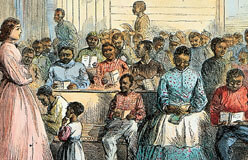Did you ever have a difference of opinion with someone that you just couldn’t work out? The kind of argument where you both were equally sure you were right?
In the early years of the U.S., the Northern and Southern states had that kind of difference of opinion. The conflict was over slavery.
By 1775, three-fourths of all enslaved Africans in the colonies lived in the South. Rich plantation owners believed they couldn’t survive without the free labor of slaves to work their fields. Some Northerners thought slavery was wrong. Southerners feared that Congress, where the North had a majority, would outlaw slavery. Many Southerners argued for states’ rights—the idea that states should have more power than the national government.
When Abraham Lincoln was elected president, the conflict came to a head. Lincoln represented the Republican Party, which was formed in 1854 to stop the expansion of slavery. Southern plantation owners were sure Lincoln would destroy their way of life. Between Lincoln’s election in November 1860 and his inauguration in March 1861, seven states seceded from the Union. Lincoln was determined to preserve the Union. War was unavoidable.







